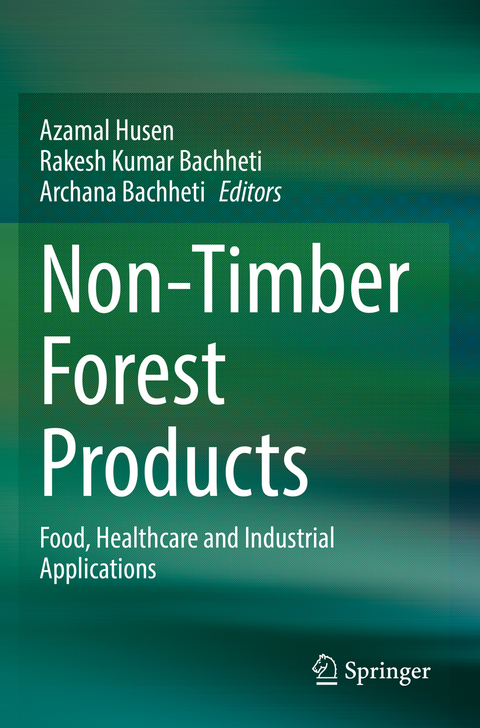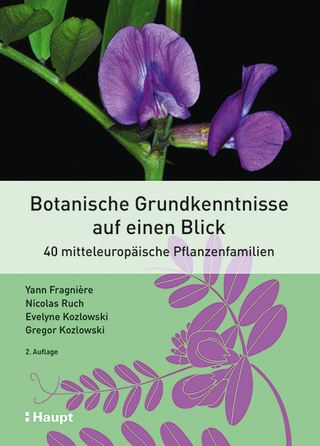
Non-Timber Forest Products
Springer International Publishing (Verlag)
978-3-030-73079-6 (ISBN)
Professor Azamal Husen (BSc from Shri Murli Manohar Town Post Graduate College, Ballia, UP; MSc from Hamdard University, New Delhi; and PhD from Forest Research Institute, Dehra Dun, India) is a Foreign Delegate at Wolaita Sodo University, Wolaita, Ethiopia. He has served the University of Gondar, Ethiopia, as a Full Professor of Biology, and also worked as the Coordinator of MSc Program and the Head, Department of Biology. He was a Visiting Faculty of the Forest Research Institute, and the Doon College of Agriculture and Forest at Dehra Dun, India. He has a more than 20 years' experience of teaching, research and administration. Dr. Husen specializes in biogenic nanomaterials fabrication and their application, plant response to nanomaterials, plant production and adaptation to harsh environments at physiological, biochemical and molecular levels, herbal medicine, and clonal propagation and improvement of tree species. He has conducted several research projects sponsored by various funding agencies, including the World Bank, the Indian Council of Agriculture Research (ICAR), the Indian Council of Forest Research Education (ICFRE); and the Japan Bank for International Cooperation (JBIC), etc. He has published over 100 research papers, review articles and book chapters, edited books of international repute, presented papers in several conferences, and produced over a dozen of manuals and monographs. Dr. Husen received four fellowships from India and a recognition award from University of Gondar, Ethiopia, for excellent teaching, research and community service. An active organizer of seminars/conferences and an efficient evaluator of research projects and book proposals as he is, Dr. Husen has been on the Editorial board and the panel of reviewers of several reputed journals of Elsevier, Frontiers Media SA, Taylor & Francis, Springer Nature, RSC, Oxford University Press, Sciendo, The Royal Society, CSIRO, PLOS and John Wiley & Sons. He is included in the advisory board of Cambridge Scholars Publishing, UK. He is a Fellow of the Plantae group of American Society of Plant Biologists, and a Member of International Society of Root Research, Asian Council of Science Editors, and INPST, etc. Also, he is Editor-in-Chief of American Journal of Plant Physiology; and a Series Editor of 'Exploring Medicinal Plants' published by Taylor & Francis Group, USA. Dr. Rakesh Kumar Bachheti graduated from the Hemwati Nandan Bahuguna University, Garhwal, India, in 1996. He completed his MSc in Organic Chemistry from Hemwati Nandan Bahuguna University, Garhwal, India in 1998. He had undergone a one-year Post Graduate Diploma in Pulp and Paper Technology from Forest Research Institute, Dehradun, in 2001. He obtained his PhD in Organic Chemistry from Kumaun University, Nainital, India in 2007. He is presently working as an Associate Professor of Organic Chemistry in the Department of Industrial Chemistry at the Addis Ababa Science and Technology University (AASTU) of Ethiopia, where he teaches PhD, graduate and undergraduate students. Before joining AASTU, Dr. Rakesh was working as Dean Project (Assistant) in Graphic Era University (A grade university by NACC) Dehradun, India. Dr. Rakesh also presented papers in various international and national conferences. His major research interests include natural product for industrial application, biofuel and bioenergy, green synthesis of nanoparticles and their applications, and pulp and paper technology. He has successfully advised 30 MSc and 3 PhD students to completion and countless undergraduates have researched in his laboratory. Dr. Bachheti has over 50 publications dealing with various aspects of natural product chemistry and has eight book chapters published by Springer, Elsevier, Taylor & Francis, and Nova Publisher. Presently, he is supervising 5 PhD students, 3 Master's students and also working for two research projects funded by AASTU. Dr. Archana (Joshi) Bachheti did BSc in the year 1997, and MSc in 1999 from Hemwati Nandan Bahuguna University, Garhwal, India. She received her PhD from Forest Research Institute, Dehradun, India in 2006. She has carried out research projects and consultancy work in the areas of ecorestoration/ development of wasteland, physico-chemical properties of Jatropha curcus seed oil and their relation with altitudinal variation; and has been a Consultant Ecologist to a project funded by some governmental agencies. Dr. Joshi, currently an Associate Professor at Graphic Era University, Dehradun, India. She has also served in many capacities in the academia within India and provided expertise internationally for more than 15 years where she taught Ecology and Environment, Environmental Science, Freshwater Ecology, Disaster management, and Bryophytes and Pteridophytes. Her major research interests encompass the broad, interdisciplinary field of plant ecology, with focus on eco-restoration, green chemistry especially the synthesis of nanomaterials, and medicinal properties of plants. She organized several National seminars and conferences. She guided one PhD student and at present supervising three scholars, as well as guided graduate and undergraduate students for their research projects. Dr. Joshi has published more than 50 research articles in international and national journals along with six book chapters.
Preface.- Potential role of forest-based plants in essential oil production: an approach to cosmetic and personal health care applications.- Aromatic oils from forest and their application.- Role of traditional chewing sticks in oral hygiene and other benefits.- Plant-based sweeteners and their applications in modern lifestyle.- Nutritional, pharmaceutical and industrial potential of forest-based plant gum.- Commercial, cosmetic and medicinal importance of sandal (Santalum album): a valuable forest resource.- Forest-based edible seeds and nuts for healthcare and disease control.- Medicinal plants of Himalayan forests.- Forest-based medicinal plants for cardiovascular diseases.- Potential role of medicinal plants in cure of liver and kidney diseases.- Forest-based medicinal plants for cancer cure.- Health benefit, traditional and modern uses of natural honey.- Spices obtained from forest and other resources.- Ganoderma lucidum: king of mushroom.- Health-promoting benefits, value-added products and other uses of banana.- Forest-based plants in beautification and their medicinal significance.- Food, fodder and fuel-woods from forest.- Fibre from forest and their importance in modern time.
| Erscheinungsdatum | 02.08.2022 |
|---|---|
| Zusatzinfo | XVII, 473 p. 53 illus., 39 illus. in color. |
| Verlagsort | Cham |
| Sprache | englisch |
| Maße | 155 x 235 mm |
| Gewicht | 747 g |
| Themenwelt | Naturwissenschaften ► Biologie ► Botanik |
| Naturwissenschaften ► Biologie ► Ökologie / Naturschutz | |
| Weitere Fachgebiete ► Land- / Forstwirtschaft / Fischerei | |
| Schlagworte | agroforestry • ethnobotany • forestry • Medicinal plants • Medicobotany • Non-timber forest products • Non-wood forest products • NTFPs |
| ISBN-10 | 3-030-73079-4 / 3030730794 |
| ISBN-13 | 978-3-030-73079-6 / 9783030730796 |
| Zustand | Neuware |
| Informationen gemäß Produktsicherheitsverordnung (GPSR) | |
| Haben Sie eine Frage zum Produkt? |
aus dem Bereich


